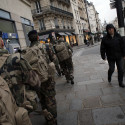Charlie Hebdo’s defiant new issue sold out before dawn Wednesday around Paris, with some scuffles at kiosks over dwindling copies of the satirical paper fronting the Prophet Muhammad. In a city still shaken after deadly Islamic terror attacks, authorities said 54 people had been detained for defending or glorifying terrorism.
The arrests are part of a broader French crackdown that includes a government push for tougher anti-terrorism measures after the attacks, the worst in France in decades.
Dieudonne, a controversial comic with a large following in France, was among those detained. Government spokesman Stephane Le Foll said some of those detained have already been convicted — a display of French justice that was notably rapid.
The storming of the irreverent Charlie Hebdo newspaper was the opening salvo of three days of terror and bloodshed in the Paris region, ending when security forces killed all three gunmen on Friday. A top leader of Yemen’s al-Qaida branch claimed responsibility for the Charlie Hebdo attack, saying in a video posted Wednesday that the massacre was in “vengeance for the prophet.”
The core of the newspaper’s staff perished a week ago when gunmen stormed its offices, killing 12. Those who survived put out the issue Wednesday, working out of borrowed offices, with a print run of 3 million — more than 50 times the usual circulation.
Charlie Hebdo had received repeated threats for posting caricatures of Muhammad and was firebombed in 2011. Its editor and his police bodyguard were the first targeted in the newsroom.
France’s government was preparing tougher anti-terrorism measures, and authorities were already using current laws to their fullest extent. Wednesday’s detention of Dieudonne for defending terrorism followed a four-year prison sentence involving the same charge for a man in northern France who seemed to defend the attacks in a drunken rant while resisting arrest.
French police say as many as six members of a terrorist cell that carried out the Paris attacks may still be at large, including a man seen driving a car registered to the widow of one of the gunmen. The country has deployed 10,000 troops to protect sensitive sites, including Jewish schools and synagogues, mosques and travel hubs.
Dieudonne, who popularized an arm gesture that resembles a Nazi salute and who has been convicted repeatedly of racism and anti-Semitism, is no stranger to controversy. His provocative performances were banned last year but he has a core following among many of France’s disaffected young people.
The Facebook post in question, which was swiftly deleted, said he felt like “Charlie Coulibaly” — merging the names of Charlie Hebdo and Amedy Coulibaly, the gunman who seized a kosher market and killed four hostages, along with a policewoman.
In a separate post Monday afternoon, the day the investigation was opened into Dieudonne, the comic wrote an open letter to France’s interior minister. Like many European countries, France has strong laws against hate speech and especially anti-Semitism in the wake of the Holocaust.
“Whenever I speak, you do not try to understand what I’m trying to say, you do not want to listen to me. You are looking for a pretext to forbid me. You consider me like Amedy Coulibaly when I am not any different from Charlie,” he wrote.
In a posthumous video, Coulibaly had claimed allegiance to the Islamic State group. Brothers Said and Cherif Kouachi, who stormed Charlie Hebdo, had told survivors they were sent by al-Qaida in Yemen.
In an 11-minute video on Wednesday, Nasr al-Ansi, a top commander of Al-Qaida in the Arabian Peninsula, or AQAP as the branch is known, says Yemen’s al-Qaida branch “chose the target, laid out the plan and financed the operation.”
Solidarity for Charlie Hebdo, although not uniform, was widespread in France and abroad. Defending his caricature of Muhammad on the cover, Charlie Hebdo cartoonist Renald Luzier, also known as Luz, argued that no exceptions should be made when it comes to freedom of expression.
He said that when Charlie Hebdo drew threats and attacks in the past, the reaction was often: “Yes, but you shouldn’t do that (publish cartoons of Muhammad). Yes, but you deserved that.”
“There should be no more ‘yes, but,” he insisted.
On Wednesday, the new issue vanished from kiosks immediately. Some newsstand operators said they expected more copies to arrive on Thursday. One kiosk near the Champs Elysees, open at 6 a.m., was sold out by 6:05. Another, near Saint-Lazar, reported fisticuffs among customers.
“Distributing Charlie Hebdo, it warms my heart because we say to ourselves that he is still here, he’s never left,” said Jean-Baptiste Saidi, a van driver delivering copies well before dawn on Wednesday.
French Interior Minister Bernard Cazeneuve was among those to get a copy before they sold out.

